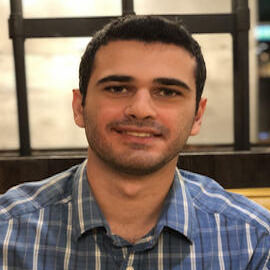IRIS-HEP Fellow: Ali Hariri

Fellowship dates: May – Aug, 2021
Home Institution: University of Alabama
Project: Graph Generative Models For Fast Detector Simulations in Particle Physics
The Large Hadron Collider (LHC) at CERN is the world’s highest energy particle accelerator, delivering the highest energy proton-proton collisions ever recorded in the laboratory, permitting a detailed exploration of elementary particle physics at the energy frontier. Simulating the particle showers and interactions in the LHC detectors is both time consuming and computationally expensive. Present fast simulation approaches based on non-parametric techniques can improve the speed of the full simulation chain but suffer from lower levels of fidelity. For this reason, alternative methods based on machine learning can provide faster solutions, while maintaining a high level of fidelity. The main goal of a fast simulator is to map the events from the generation level directly to the reconstruction level. The recent rise of deep generative models paved the way for novel AI-based simulation methods. These are characterized by a high ability to learn complex data features in a high dimensional space as probability distributions to reconstruct or simulate new samples from those data. Hence, generative models make great candidates for the representation learning of particle collision events. The most used generative architectures are Generative Adversarial Networks and Variational Auto-Encoders . Given the non-Euclidean nature of jet events data, we aim to investigatethe efficiency of graph generative models in simulating event reconstructions in a given detector.
More information: My project proposal
Mentors:
-
Sergei Gleyzer (University of Alabama)
-
Harrison Prosper (Florida State University)
-
Michelle Kuchera (Davidson College)
- 6 Oct 2021 - "Graph Generative Models for Fast Detector Simulations in Particle Physics", Ali Hariri, IRIS-HEP Topical Meetings Recording: Graph Generative Models for Fast Detector Simulations in Particle Physics
Current Status
October 2021 - Doctoral Student at École polytechnique fédérale de Lausanne
Contact me: